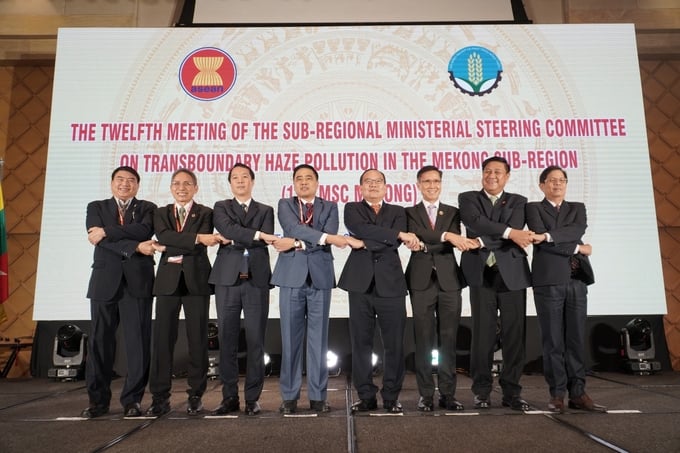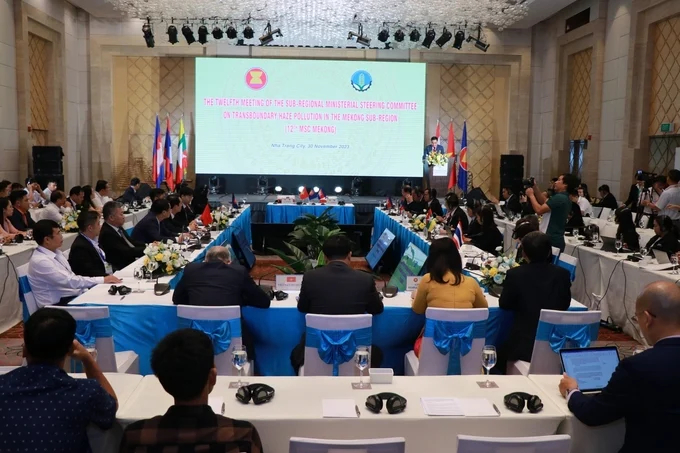November 28, 2025 | 04:59 GMT +7
November 28, 2025 | 04:59 GMT +7
Hotline: 0913.378.918
November 28, 2025 | 04:59 GMT +7
Hotline: 0913.378.918

The conference agreed to establish the ASEAN Coordination Center for Transboundary Haze Pollution Control and expected the centre to operate effectively. Photo: PC.
On November 30, in Nha Trang City, the Ministry of Agriculture and Rural Development coordinated with the Khanh Hoa Provincial People's Committee and relevant parties to organize the Twelfth meeting of the Sub-regional Ministerial Steering Committee on Transboundary Haze Pollution in the Mekong Sub-region. The conference was attended by leaders of five Mekong sub-region countries including Cambodia, Laos, Myanmar, Thailand and Vietnam.
The conference was organized to share knowledge, and experience, discuss solutions, and make important decisions related to forest fire and peatland fire management issues, as well as managing and controlling haze pollution in Mekong sub-region countries in particular and the ASEAN community in general, aiming towards a haze-free ASEAN.
Speaking at the conference, Deputy Minister of Agriculture and Rural Development Nguyen Quoc Tri said: We need to strengthen forest fire prevention and fighting, promote monitoring and early warning. This is a top priority to minimize the occurrence of transboundary haze pollution. In addition, Vietnam commits to devoting all necessary resources to well-implement activities on sustainable forest management, protection and development of forest resources.
“To cope with unusual weather developments, especially the impact of El Nino, Vietnam calls for comprehensive cooperation from countries in the Mekong sub-region, with the joining hands of donors and international organizations to act together for an ASEAN community that always has a clean environment and sustainable development", Deputy Minister of Agriculture and Rural Development Nguyen Quoc Tri said.

Countries in the Mekong sub-region discussed and made important decisions on haze pollution management and control, towards a haze-free ASEAN. Photo: PC.
At the conference, countries discussed and shared initiatives to minimize forest fires, and peatland fires and control haze pollution in the dry season. In addition, countries also emphasized the importance of action-oriented programs as well as the role of local communities in the prevention, control, reduction and treatment of transboundary haze pollution.
At the same time, the conference also proposed a second roadmap for ASEAN cooperation towards controlling transboundary haze pollution, the second ASEAN peatland management strategy and implementation measures, as well as the ASEAN investment framework for haze-free sustainable land management.
The conference also agreed to establish the ASEAN Coordination Center for Transboundary Haze Pollution Control and expected the centre to operate effectively. In addition, there will be a mid-term review of the roadmap to check progress and maintain momentum to ensure the achievement of the haze-free ASEAN goal by 2030.
Translated by Hoang Duy

(VAN) After the institutional merger, Da Nang possesses significant forest-carbon reserves and is proactively engaging in the carbon market, creating a new revenue stream.

(VAN) An Giang strengthens communication against IUU fishing, increases inspections and sanctions, and is determined to remove the EC’s “yellow card” while developing a sustainable fisheries sector.

(VAN) As green transition becomes a global trajectory, Viet Nam’s biggest challenge is not only technology and models, but how to ensure that capital flows reach the right beneficiaries.

(VAN) The Ministry of Agriculture and Environment must spearhead the construction of green governance, spanning decision-making processes and investment standards to policy evaluation mechanisms.

(VAN) The Agriculture and Environment sector of Khanh Hoa has achieved numerous milestones over the past 80 years, contributing significantly to the goal of establishing the province as a centrally governed city by 2030.

(VAN) Viet Nam is entering the pivotal period of 2025-2030, moving toward the formulation of the Remote Sensing Law, which will establish a legal foundation for the development of national digital data.

(VAN) The agricultural sector is finalizing the strategic framework for emission reduction, setting the goal of sharply cutting methane and 403.7 million tons of CO2 equivalent and moving toward Net Zero by 2050.